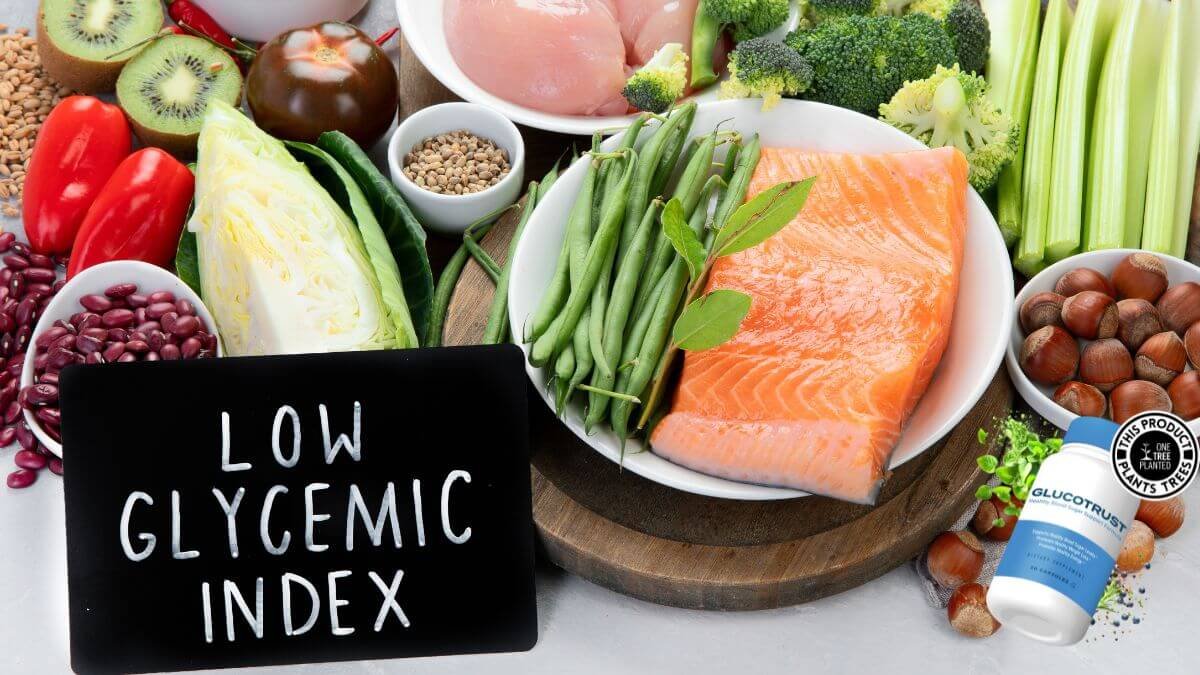Getting Started: Glycemic Index Inflammation
If you’ve ever noticed discomfort in your body after eating certain foods—whether it’s joint pain, bloating, or general fatigue—you may be experiencing the effects of what’s known as glycemic index inflammation. The connection between what you eat and how your body reacts, especially in terms of inflammation, is more significant than most people realize. In this article, I’ll explain exactly how the glycemic index impacts inflammation, how you can use dietary adjustments to reduce it, and how supplements like Glucotrust can play a role in managing inflammation in a natural, holistic way.
Discover our natural products store: SALE SUPRA
Discover the power of GLUCOTRUST
If inflammation has been a recurring issue in your life, you’re in the right place. Understanding the root causes of inflammation, particularly how the glycemic index influences this process, can empower you to make better choices that positively affect your overall health. So, let’s break it down and learn how to address this concern by making smart dietary choices and integrating natural supplements into your routine.
How does the glycemic index affect inflammation in the body?

The glycemic index measures how quickly carbohydrates raise blood sugar levels. High-GI foods cause blood sugar spikes, which in turn lead to inflammation. Low-GI foods help maintain steady blood sugar and reduce inflammation naturally.
What is Glycemic Index and Why Does It Matter for Inflammation?
The glycemic index (GI) is a ranking system used to measure how quickly carbohydrate-containing foods cause an increase in blood glucose (sugar). Foods that are high in carbohydrates, such as white bread, sugary snacks, and processed foods, tend to be absorbed very quickly into the bloodstream. As a result, they cause a rapid spike in blood sugar, followed by a sharp drop. This cycle can trigger a cascade of physiological responses in the body, particularly in the form of inflammation. Glycemic Index Inflammation
In simple terms, when your body is hit with a spike in blood sugar, it goes into “overdrive,” trying to regulate it. This process requires the release of insulin, a hormone responsible for reducing blood sugar levels. However, when this happens too frequently due to a diet rich in high-GI foods, your body starts producing excess insulin. Over time, this can lead to insulin resistance, a condition where the body’s cells no longer respond properly to insulin. This, in turn, leads to chronic inflammation, which has been linked to several diseases such as type 2 diabetes, cardiovascular conditions, and autoimmune disorders. Glycemic Index Inflammation
What’s more alarming is that the body’s natural inflammatory response, when activated over extended periods, can disrupt vital bodily functions. If left unaddressed, this constant low-grade inflammation can contribute to more serious health complications. Therefore, understanding the glycemic index and its effects on inflammation is crucial for making informed choices about what we eat. Glycemic Index Inflammation

How High-Glycemic Foods Contribute to Inflammation
Over the years, I’ve personally experienced the difference in how I feel after consuming foods with a high glycemic index. For instance, I used to eat white bread and sugary snacks without much thought, but I quickly realized how these foods made me feel sluggish and irritable. After digging deeper into how food impacts my body, I discovered that these types of foods not only raised my blood sugar levels quickly but also triggered an inflammatory response in my body. Glycemic Index Inflammation
Foods that contribute to high glycemic index inflammation include: Glycemic Index Inflammation
- Refined Carbohydrates: Foods such as white bread, pastries, and pizza dough are often made from refined flour. These carbohydrates are digested rapidly, causing your blood sugar to spike.
- Sugary Snacks and Beverages: Candy, soda, and sweetened drinks are loaded with sugar, causing an immediate surge in blood sugar levels, which can trigger inflammation.
- Fried and Processed Foods: Foods like French fries, fried chicken, and other deep-fried snacks contain both a high glycemic load and trans fats, which exacerbate inflammation.
- Processed Meats: Bacon, sausages, and deli meats are examples of processed foods that contain high amounts of sodium, preservatives, and chemicals that promote inflammation.
This type of high-GI food consumption often leads to a vicious cycle of blood sugar spikes and drops, resulting in chronic inflammation. Over time, this can contribute to joint pain, headaches, fatigue, and a weakened immune system.

The Benefits of Low-Glycemic Foods in Reducing Inflammation
I’ve found that making the switch to low-GI foods has had a profound effect on how I feel day-to-day. With the new awareness I gained about how certain foods impact inflammation, I’ve begun incorporating more low-GI options into my meals. The difference is remarkable. I feel more energized, my skin looks healthier, and my joints aren’t as stiff in the morning.
Here are some examples of low-GI foods that are beneficial for reducing inflammation: Glycemic Index Inflammation
- Whole Grains: Foods like brown rice, quinoa, oats, and barley are rich in fiber, and they take longer to break down in the body. This helps regulate blood sugar levels and reduces inflammation.
- Legumes: Beans, lentils, chickpeas, and peas are not only rich in protein and fiber but also have a low glycemic index. They help stabilize blood sugar levels and provide long-lasting energy.
- Vegetables: Leafy greens like spinach, kale, and arugula, as well as cruciferous vegetables like broccoli and cauliflower, have very low glycemic indices and are packed with anti-inflammatory nutrients like antioxidants, vitamins, and minerals.
- Fruits: Berries such as strawberries, blueberries, and raspberries are not only delicious but are low on the glycemic index. Apples, cherries, and pears also help manage blood sugar while offering essential nutrients that combat inflammation.
- Nuts and Seeds: Almonds, walnuts, flaxseeds, chia seeds, and pumpkin seeds contain healthy fats that help reduce inflammation while providing a host of beneficial nutrients.
By focusing on low-GI foods, we can maintain stable blood sugar levels, which in turn helps reduce the body’s inflammatory response. This shift can lead to improved energy levels, better mood, and a reduction in chronic pain associated with inflammation. Glycemic Index Inflammation

How Glucotrust Supports Glycemic Index Inflammation Management
If you’ve been reading about how dietary changes can help manage inflammation, you may be wondering how to take things a step further. This is where Glucotrust comes in. Glucotrust is a natural supplement that supports healthy blood sugar levels and enhances insulin sensitivity. When combined with a low-GI diet, Glucotrust can work synergistically to help reduce glycemic index inflammation.
Glucotrust contains ingredients that promote the optimal function of insulin in the body, helping your body regulate blood sugar more effectively. As a result, it can reduce blood sugar spikes, support a healthier metabolism, and alleviate the chronic inflammation that stems from blood sugar imbalances.
Personally, I’ve incorporated Glucotrust into my daily routine, and I’ve noticed significant improvements in my overall well-being. Not only has my energy level stabilized, but I also feel more in control of my blood sugar. This supplement has been an invaluable addition to my efforts to manage inflammation, especially when combined with the right diet and exercise regimen.
Simple Lifestyle Changes for Managing Inflammation
Beyond food choices and supplements, there are several lifestyle changes that can help mitigate inflammation. I’ve made it a priority to incorporate these habits into my daily routine, and I’ve seen firsthand how they can enhance overall health. Glycemic Index Inflammation
- Exercise: Regular physical activity is one of the most effective ways to reduce inflammation. Whether it’s walking, cycling, or yoga, exercise helps regulate immune function and reduce inflammatory markers in the body.
- Adequate Sleep: Sleep is essential for repairing the body and reducing inflammation. Aim for 7-9 hours of quality sleep each night to give your body time to heal and recover.
- Stress Management: Chronic stress can elevate cortisol levels, which contribute to inflammation. Incorporating mindfulness practices, such as meditation or deep breathing exercises, can help reduce stress and its inflammatory effects.
- Hydration: Staying well-hydrated helps flush toxins from your system and supports overall cellular function. Drinking enough water is crucial for maintaining optimal health and reducing inflammation.
By implementing these simple, yet powerful, lifestyle changes, you can create an environment within your body that is less prone to inflammation. Glycemic Index Inflammation
The Final Takeaway
In conclusion, understanding the link between the glycemic index and inflammation has been a game-changer for me. By switching to low-GI foods and using supplements like Glucotrust, I’ve been able to manage my blood sugar levels more effectively, reduce inflammation, and improve my overall health. These changes may seem small at first, but over time, they can make a significant difference in how you feel every day. Glycemic Index Inflammation
If inflammation has been affecting your life, I encourage you to start making conscious food choices, incorporate Glucotrust into your routine, and prioritize healthy habits. By taking charge of your health, you’ll find that reducing inflammation naturally is within your reach. Glycemic Index Inflammation
FAQ – Frequently Asked Questions
How does glycemic index affect inflammation?
High-GI foods cause rapid blood sugar spikes, leading to the release of inflammatory markers in the body. Low-GI foods help stabilize blood sugar and reduce inflammation.
What are some good low-GI foods for inflammation?
Whole grains, legumes, leafy greens, berries, and nuts are all excellent choices for reducing inflammation while maintaining steady blood sugar levels.
Can Glucotrust help manage inflammation?
Yes, Glucotrust supports blood sugar regulation and improves insulin sensitivity, which can help reduce inflammation over time.
How long does it take to see results from Glucotrust?
Many users report feeling more energized and experiencing improved blood sugar regulation within a few weeks of consistent use.
What lifestyle changes can I make to reduce inflammation?
Regular exercise, quality sleep, stress management, and staying hydrated are all important for reducing inflammation in the body.
Can a low-GI diet completely eliminate inflammation?
While a low-GI diet can significantly reduce inflammation, combining it with other lifestyle factors like exercise and sleep will provide the best results.

I’m an economist with 15 years of experience in strategic planning and a lifelong passion for wellness and natural living. As a self-learner, I created Herbalife Balance to share insights on healthy eating, mindful habits, and an active lifestyle. Tennis enthusiast and nature lover, I believe in balance as a path to well-being. Through this blog, I help others live healthier, more conscious lives.







